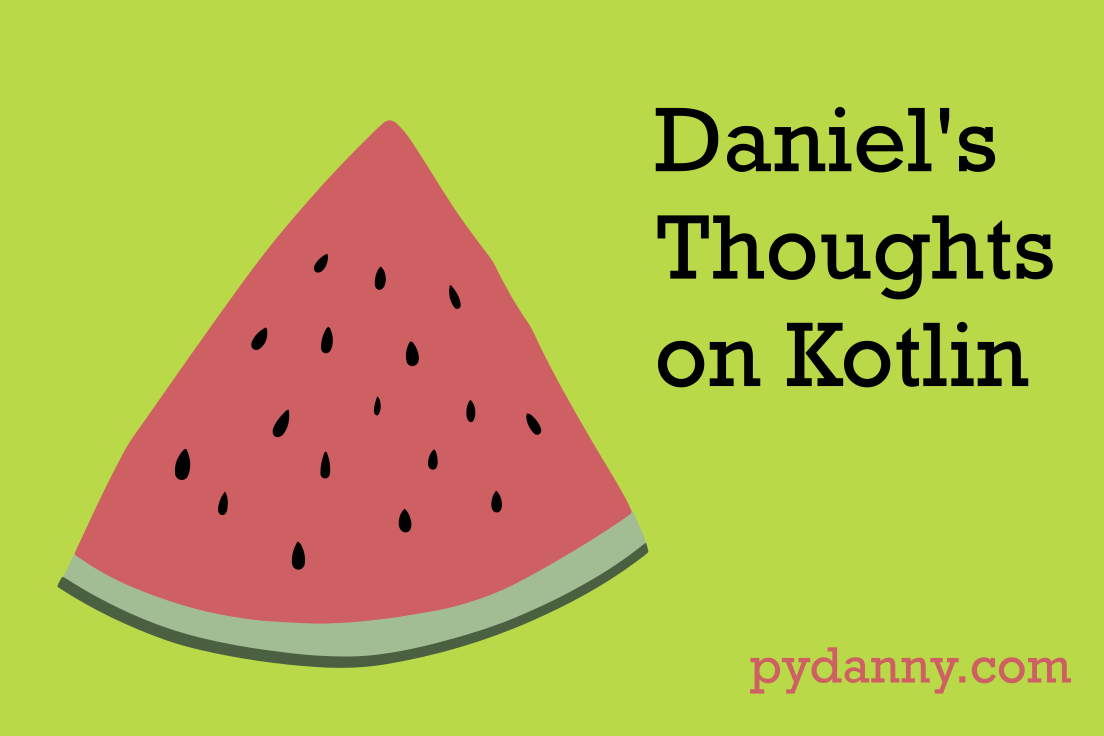Thoughts on Kotlin
This past weekend Audrey and I competed in the Los Angeles edition of the Tech to Protect Challenge hackathon. It was fun, we came up with ideas to increase people's safety, talked to first responders, and learned how to build Android apps with Kotlin. We won in our category, but that's a blog post for another day.
This blog post contains my notes on Kotlin.
Variable Declaration
Kotlin has two variable types, mutable and immutable. You distinguish between them by defining them with val for immutable and var for mutable. You can specify type, but Kotlin can infer type based on how you declare it.
// immutables
val a = "I am an immutable string"
val b:String = "I am an immutable string with an explicit declared type of String"
// mutables
var c = "I am a mutable string"
var d:String = "I am an string with an explicit declared type of String"Char vs String / Single Quotes vs Double Quotes
This caught me completely off-guard. Especially as I prefer using single quotes. It's one less key to press on the US keyboard.
You see, unlike Python and Javascript, Kotlin differentiates between Char and String types. In simplest terms, a Char must have a single character and is surrounded by single quotes and String has zero to many characters and is surrounded by double quotes.
// Char example, throws an error if variable has more than 1 character
val singleLetterVariable:Char = 'a'
// String examples
val emptyString:String = ""
val singleLetterVariable2:String = "b"
val manyLettersVariable:String = "Learning is fun"When Instead of Switch/Case
Python doesn't have a switch or case statement, and neither does Kotlin. Instead it has a when keyword that very much shortens the dialogue necessary for branch control. Rather than using this traditional switch/case style code:
function numberToString(argument) {
switch (argument) {
case 0:
return "zero";
case 1:
return "one";
case 2:
return "two";
default:
return "nothing";
}
}In Kotlin you describe it thus with when:
fun numberToString(number: Int): String {
when(number) {
0 -> return "zero"
1 -> return "one"
2 -> return "two"
else -> return "nothing"
}
}This syntax is is concise and powerful. In fact, there's a lot of syntactical sugar I'm not covering.
General Control Flow
There's a lot of similarity with other languages:
if/else/else ifkeywords.forloopswhiledo while
Data Classes
Just as Python has Dataclasses, Kotlin comes with a similar, more constrained Data Class:
>>> // Define the data class
>>> data class Baby(val name: String, val age: Int, val ageType: String)
>>> // Instantiate and display the result
>>> val daughter = Baby(name="Uma", age=10, ageType="months")
>>> println(daughter.name)
UmaMutableMaps as Python/Javascript-Style Key/Value Structures
One thing I dislike about Java is while there are many ways to do key/value structures, none of them fit my brain like Python dictionaries or Javascript objects. Mutable maps are the closest thing to what I prefer, and Kotlin has it as a stdlib function called mutableMapOf to support it:
>>> val daughter = mutableMapOf("name" to "Uma", "age" to 10, "ageType" to "months")
>>> println(daughter["name"])
UmaSummary
What I like about Kotlin is that it follows pretty standard syntactic patterns, there's no wheels being reinvented. Even the when statement is pretty straightforward. While there's quirks such as the use of single quotes with the Char type, nothing makes me want to bang my head against the wall. Instead, I was productive in minutes upon first looking at the language.
Tags: kotlin hackathon

